#It's because we are a group of people that has been deemed “inferior”
Explore tagged Tumblr posts
Text

#Why do people in the LGBTQ+ community moralize bisexuality?#It's because we are a group of people that has been deemed “inferior”#Why should they respect us as people when we are simply creatures acting on our own inferiority?#This is why you get non bisexuals and pick me bisexuals proclaiming bisexuals in a “het” relationship don't belong in their own community#even if the people in the “het” relationship are both bisexual#this is also why you get “brilliant” comments suggesting bisexuals go to DV organizations centered around helping gay people#wow Rebecca that is such an intelligent thing to say... I bet the gay people would sure love to hear bis talk about their “het”#relationships. Because you know -- bisexuals and gay ppl are totally the same and have the same problems [this is sarcasm]#your intelligence really is.... unique#I guess you also think it would be a good idea for bisexuals to talk about their “gay” relationships with straight people#see these mind games don't work on me anymore because everyone who says shit like this is actually a fucking loser#i don't need non bisexuals to lecture me on my non existent privilege... you motherfuckers haven't been on a date in 10 years#no one likes you because youre unpleasant to be around#but of course you will never see your current state of loneliness as something you are responsible for because you are a perpetual victim#it's much easier to blame your problems on someone else [ei: bisexuals] than to take accountability for your actions#and actually do the work to fix your fucked up life
8 notes
·
View notes
Text
A System of “Dominance & Submission”. How this explains Male behaviour.

Men function in a system of dominance and submission, where they love to thrive usually at the expense of others. Those “others” are usually Women. There’s a reason why Men are flooding to the political right, the political right operates under a belligerent hierarchal system that excludes people on the basis of gender, class, race, and sexuality, ostracising most people in our society. Prioritizing the privilege whilst undermining the marginalized directly falls in line with how Men operate within the “dominance and submission” system, this explains why Men are flocking to the political right & manosphere in droves. It’s really about benefiting themselves at the exploitation of others.
The reason why Misogyny and the hatred of feminism are at an all-time high is because Men want to feel dominant and if they can’t feel dominant amongst other Men, the “easiest” way they deem to experience that feeling, is over Women. When women are no longer restricted or controlled. Men see this as a huge disadvantage because they’ve lost all their bargaining power and women no longer need to opt into these relationships, as the artificial dependence on Men has been removed.
Although we still live in a hierarchal system broadly speaking in our society, it no longer applies to the dynamics between Men and Women in relationships as Women can choose to opt out completely. Men have lost their monopoly of power over Women and they feel like they’ve been done a great disservice. That’s why we keep hearing about the “male loneliness epidemic” and “disenfranchised young men” The only thing that Men feel disenfranchised by is the fact that they no longer can have a free wife slave for just existing as a Man. Men feel like they’ve lost their social standing in society and that is rooted in having a false and artificial sense of superiority over Women.
Men’s struggle to value the humanity of people around them and their lack of introspection/EQ will keep them stagnant and unable to move forward in society. Women’s ability to incorporate and adopt what we deem both “feminine” and “masculine” is the reason why Women are outperforming Men in education, academic achievement, workplace participation, and social influence.
The reason why Men are failing in modern-day society, it’s that Men are incapable of adopting what we deem “feminine” traits such as cooperation and collaboration amongst their fellow human beings because they are socialized to be individualistic and self-serving. And to see anything that’s related to Women as “beneath them” or “women’s work”, because once again they see Women as inferior and less than. Their inability to think and act beyond this binary of “dominance/submission” and “masculine/feminine” is the reason why they’ll continue to fall further behind.
The further that Men continue to fall behind the more the government will have to create more artificial reasons for them to exist at the expense of Women, by rescinding Women's fundamental human rights in the US - they’ve taken Roe V Wade off the table, conservative lawmakers are planning to take no fault divorce off the table, fully well knowing that Women predominately file for divorce. It’s to control women’s movement, to create an artificial dependency on Men, to give Men a reason to exist ultimately at the expense of Women.
We know that single lonely men are one of the most dangerous groups in society and the government recognizes this. Men are dependent on Women in their lives to thrive, reproduce and have a life that’s worth living, just like a parasite is dependent on a host to survive. When Men struggle, Women have to suffer as a result of this and it’s like a self fulfilling cycle of nature trying to figure out what the male part of this population is really good for.
Understanding this system of dominance and submission will explain 90% of their behaviours. Men are wired to function in this inhumane system due to socialisation, the only way I believe men can break free through from this mindset is if they stop viewing the world through an androcentric & patriarchal lens and start seeing Women as human beings and to start seeing the humanity in the people they’re around. Most Males will probably not, but those Males are bound to be left behind by everyone around them, these Males are moving further to the right wing, joining futile movements like the manosphere and the red pill, trying to justify and find meaning in their existence within these movements. Where they promote “traditional masculinity” but none of it is in line with their actual reality. There’s a certain level of cognitive dissonance Men are going through currently in the modern world. - (I will go in more detail about this in another post)
If you’ve made it this far, thanks for reading :).
- recoveringsoulposts
24 notes
·
View notes
Text
15 Day Bl Challenge - Part 4
Day 59 - What's a hill you're willing to die on when it comes to BL?
Lol, I probably have an unhealthy number of hills around BL. I think a lot of it is due to my age, and having grown up with ZERO good or fun representation in my media. "These kids today" cranky old lady thoughts, y'all. But for everyone's sake, I will try to keep this simple and not get too ranty.
Not liking something is not remotely the same as it being objectively bad.
Like all art, media is a subjective experience. It just is. You can make plenty of lists about what constitutes "good" and "bad", you can write long analytical posts, you can make valid points about writing, acting, and cinematography, you can bitch until the sun goes down, it doesn't change this. Art is subjective.
There may be general "rules" in terms of what is effective art, and what tends to speak the most to the largest group of people, but also every single one of those rules has been broken at some point in a successful piece of media.
At the end of the day, we all have our own distinct lens and distinct experience with what we are consuming.
No one is wrong for liking something you don't like. No one is inferior to you for their taste. No one is less authentically queer for liking what they like. No one is wrong for enjoying content you deem toxic. No one is wrong if they watch shows for reasons you think are unworthy.
Also, to interfans, please, please, please take the time to reflect on your biases before you slam the media of other countries. There's a lot of xenophobic/racist shit that gets put out there because people don't take the time to consider why they think the way they do.
26 notes
·
View notes
Note
What’s your opinion on people who are mentally ill? By comparing religion to a mental illness, what are you trying to imply?
That we should treat people claiming to have knowledge of, and be in contact with, a divine creator of the entire universe who wants to take you to heaven if you believe, or torture you forever if you don't...
... as being on the exact same level as people claiming to have knowledge of, and be in contact with, an Invisible Pink Unicorn flying overhead who will take you to the Land of Chocolate when you die if you believe, or trap you in a line at the DMV for eternity if you don't.
There is no difference. They are the same.
Now, we can show compassion for the paranoid schizophrenic plagued by concern about the Invisible Pink Unicorn spying on her at every moment, monitoring her thoughts, terrified of being tortured by an imaginary being. But we don't need to pander to her or validate her delusions; we don't need to say that' because it's real to her, that makes it real; we don't need to play along; we don't have to accept laws being made based on the wishes of the unicorn; we don't need to feel compelled to believe in it ourselves, or even pretend to; we don't need to go along with the rituals of the unicorn-believer, nor accept being treated as morally inferior when we don't. We can say, no, what you're talking about is a figment of your fevered mind, you need help. And we can hope she gets treatment, overcomes this malady, recovers and joins us in reality.
Same with the person who believes in a god or gods.
Did you know that the DSM, the Diagnostic and Statistical Manual of Mental Disorders for mental health diagnosis, has an explicit exception for religious beliefs in the definition of delusion?
Here’s how the DSM-5 defines delusions in the section "Schizophrenia Spectrum and Other Psychotic Disorders":
“Delusions are fixed beliefs that are not amenable to change in light of conflicting evidence. Their content may include a variety of themes (e.g., persecutory, referential, somatic, religious, grandiose). Persecutory delusions (i.e., belief that one is going to be harmed, harassed, and so forth by an individual, organization, or other group) are most common. Referential delusions (i.e., belief that certain gestures, comments, environmental cues, and so forth are directed at oneself) are also common. Grandiose delusions (i.e., when an individual believes that he or she has exceptional abilities, wealth, or fame) and erotomanic delusions (i.e., when an individual believes falsely that another person is in love with him or her) are also seen. Nihilistic delusions involve the conviction that a major catastrophe will occur, and somatic delusions focus on preoccupations regarding health and organ function.
Delusions are deemed bizarre if they are clearly implausible and not understandable to same-culture peers and do not derive from ordinary life experiences. An example of a bizarre delusion is the belief that an outside force has removed his or her internal organs and replaced them with someone else’s organs without leaving any wounds or scars. An example of a nonbizarre delusion is the belief that one is under surveillance by the police, despite a lack of convincing evidence. Delusions that express a loss of control over mind or body are generally considered to be bizarre; these include the belief that one’s thoughts have been “removed” by some outside force (thought withdrawal), that alien thoughts have been put into one’s mind (thought insertion), or that one’s body or actions are being acted on or manipulated by some outside force (delusions of control). The distinction between a delusion and a strongly held idea is sometimes difficult to make and depends in part on the degree of conviction with which the belief is held despite clear or reasonable contradictory evidence regarding its veracity.”
"Fixed beliefs that are not amenable to change in light of conflicting evidence" is also a good definition of faith. "Faith" is just delusions recast as virtues.
Thinking you know the will and have the ear of a magical wizard in the sky who grants you wishes and will carry you up to the clouds after you die certainly qualifies as a delusion. However, in the glossary, the DSM-5 qualifies the term:
delusion A false belief based on incorrect inference about external reality that is firmly held despite what almost everyone else believes and despite what constitutes incontrovertible and obvious proof or evidence to the contrary. The belief is not ordinarily accepted by other members of the person’s culture or subculture (i.e., it is not an article of religious faith).
No justification is given for this qualification. Whether it's accepted by other members is irrelevant to whether or not it's false. The Invisible Pink Unicorn doesn't become less of a delusion when a church forms around worshiping it.
"George Bush says he speaks to god every day, and Christians love him for it. If George Bush said he spoke to god through his hair dryer, they would think he was mad. I fail to see how the addition of a hair dryer makes it any more absurd." ― Sam Harris
8 notes
·
View notes
Text
Came across a bell hooks quote about cultural appropriation that I love: "ethnicity becomes spice, seasoning that can liven up the dull dish that is mainstream white culture." I like it because I think it speaks to an idea that I've been playing with for a while, which is about what happens to a culture when it begins to be imposed and to become a dominant and omnipresent norm.
One of the ideological systems that informs how white "western" nations perceive "non-western" nations — as well as the concept of "western"-ness itself — is Orientalism. The idea that the world is split between the logical and advanced "Occident" and the strange, mystical, and inferior "Orient". These ideas of course served to portray White Europeans as superior to every other culture and ethnic group, and are core elements of ideas such as "the white man's burden". But I think an interesting thing happens when you define the other as strange and exotic, because while you mark them as inferior, you also make them deeply interesting and novel from your perspective.
White European cultures (specifically English culture) are constructed as a sort of "default state" (one that has been and is imposed on almost every other culture on earth through both imperialism and hegemony), and I think this imagined "defaultness" also results in these dominant cultures becoming deeply boring to those who live in them. You've constructed the other as strage, exotic, and compelling, and you've also constructed yourself as the antithesis of those other cultures. Everywhere you go you can find your language, your food, your art, and your clothing. This was all done on purpose, but this imposition caused these dominant cultures to become normal, uninteresting, and invisible to those living within them, a bland grey sludge that could be spread all over the globe.
The main joke about "British food" is that it's boring and flavourless. Ultimately, we kind of end up joking that It's not like all the interesting and unique food from "the Orient" (even if we never say it like that). It's boring because we think of it as standard, we call it flavourless because the ingredients that add flavour to those dishes (garlic, onion, leek, salt, pepper, and a ton of herbs) are not considered interesting and flavourful when compared to the "exotic" and "interesting" herbs and spices of the "Orient".
Anything that becomes the hegemonic norm also becomes boring, and so a process of appropriating things from the cultures that the dominant culture marginalised begins. People want to be interesting and unique, they need something that allows them to escape the boredom of being part of the dominant culture. Therefore, they begin to steal from the cultures they deem "exotic" and "unique".
I'm beggining to think that we need to stop believing what dominant cultures and identity groups have to say about themselves, because they constantly lie about themselves (and also to themselves). These dominant white cultures perpetuate ideologies based on the idea that they are superior, civilised, and universal. However, while these cultures do cast themselves as the superior hegemons and enforce that discourse on an international scale, the practices of cultural appropriation give them away, and reveal the truth under the lie of supremacy.
In reality, the dominant white cultures of the "western" world (and especially those in colonial nations) find themselves insufferably boring. they view themselves as plain and uninteresting, they become non-cultures, devoid of novelty or interest. This is why so many white people get those DNA testing kits, they hope to discover that they have some "exotic" heritage that would render them "interesting", give them a claim to any culture other than their own. I think that deep down, under everything it claims and does, I don't think it would be inaccurate to say that whiteness hates itself. It consumes comercialised and decontextualised versions of the cultures it marginalised through imperialism and colonialism for the sake of trying to regain a sense of the uniqueness and novelty it denied itself by becoming hegemonic and imposing itself on everyone and everything that it could.
I also just quickly want to acknowledge that I've conceptualised a lot of things a bit strangely here. I've written about cultures "talking" and in doing so I've kind of personified complex social structures for the sake of abstracting them to a point at which I can communicate my train of thought. Also I think that there may be an overuse of so called "scare quotes". But ultimately, this is a Tumblr post, and I think that it works well enough in terms of allowing me to communicate my thinking, and this isn't an academic article either so I think the standards can be (and hopefully are) lower.
2 notes
·
View notes
Text
not that i have a whole lot constructive to add but this sentiment is why as much as i gravitate towards other trans fems because of our shared experiences, i also generally dont tend to exclusively associate with other trans people.
a lot of trans people - including other trans fems - have put forth this idea that “no one will love you like we do” and its gotten me trapped in some awfully abusive relationships because i was young and dumb and impressionable. im not trying to say that you should be suspicious of other trans people and only associate with cis people because thats stupid, but i try to curate my associations around shared beliefs and values.
and a lot of the time this does end up including a lot of other trans fems because theyre often the ones who really “get it”. but often i find a lot of people who arent trans fems or even arent trans *period* who i agree with on many things and who also “get it”. ultimately the idea of a single unified “transgender community” or even a single unified “trans fem community” is used as an excuse to build hostile and abusive environments where those who see themselves as superior are able to manipulate the lives of those they deem as inferior and keep them trapped in oppressive “communities” while simultaneously encouraging degrees of separatism that go beyond just “we need to look out for ourselves” and into the territory of “we need to hurt these people before they hurt us”.
maybe this is just the extent to which ive been alienated from any idea of a greater community or from others like me, maybe its my cynicism, but i firmly believe at this point there is no such thing as community based solely on who you are. there is no “trans fem community”, there is no “trans community”, and there certainly is no such thing as a “queer community”. at most there are “trans communities”, i.e. individual communities built around groups of people who all happen to share being trans, but these are most certainly not unified in any way.
community is also just something you build, its not something you inherently belong to, and by that metric anyone who claims that there is such a community is just wrong and has probably done nothing to properly build community with anyone around them.
idk sometimes i kinda wonder if such a thing as a unified "trans community" even exists. and i *definitely* wonder if such a thing as a unified "queer community" is real.
#im kind of rambling a little incoherently#please excuse me if this doesnt make any sense#or all sounds stupid#im still hung over
2K notes
·
View notes
Text
Donald Trump has been gaming this system since forever. it’s been his business model all along — to cheat investors and stiff contractors and then use the courts to his advantage, to drag everything out until his opponents give up or go broke.
which brings us to the question raised in the title of this piece: what kind of shithole country lets a corrupt criminal hell-bent on settling scores run for president? the sad answer is: ours.
Such a normal, functional nation
Congress got next to nothing done during the past year and could accomplish even less in 2024 as attention shifts to the November elections. House Republican and Senate Democratic leaders reached agreement on bills and resolutions they sent to the president’s desk just 34 times during the first year of the 118th Congress — making that session the least productive in decades.
Oklahoma Republican Rep. Tom Cole, chair of the House Rules Committee, said in late December he hadn’t heard what legislation would move through his committee this year, but doesn’t expect much....Cole said Democrats, who control the Senate, are just as much to blame for the low number of laws as Republicans, who control the House. But, he noted that it’s not necessarily a bad thing for Congress to be less productive than normal. “If you’re Republican, you believe in less government, and not doing something is sometimes a good thing,” Cole said. “Just because we passed a law, doesn’t mean it was a good law and doesn’t mean it has a positive effect. But again, I think it’s more a function of what the distribution of power is, how polarized the country is right now.”
Ah, yes, the "less government" pushed by passing a shitload of unconstitutional laws restricting abortion and discriminating against LGBTQIA folks. But I guess those don't count as "big government" because they are at the state level.
From movies, television drama, and popular culture, we have generally gotten the idea that the Nazi government was frothingly, explicitly, compulsively racist, and that its popularity, power and brutality were such that there was virtually no possibility of dissent without extreme punishment. The Republican party uses dogwhistles rather than explicitly saying it wants to murder Black people, Jews, and LGBT people (though, again, it’s been pretty explicit on that last.) It includes many people who clearly don’t intend to go out in the street with guns and shoot Democrats. So how can it be fascist?
There was not, Koonz emphasizes, any one point at which a single racist line was enforced. There were arguments about whether Jewish people were biologically inferior, culturally inferior, or theologically inferior. Some academics or officials even were what Koonz calls “yes, but” Nazis—those “semi-Nazis” Hamid refuses to believe in—who could, Koonz says, “welcome ethnic fundamentalism and economic recovery while dismissing Nazi crimes as incidental.” Nazis didn’t necessarily have to hate Jewish people personally. They just had to believe that the pure German volk had a great destiny, and that their loyalty lay with that volk. Once they agreed to that, the genocide took care of itself.
It's funny (in a not at all amusing way) how Godwin's Law used to be used to shut down discussions of discrimination and bigotry. You don't hear much about it anymore. Wonder why that is...
Substack has a zero-tolerance policy towards some things—they won’t platform sex workers or anything else they deem porn, for example—but political bad actors, apparently, they’re willing to give the benefit of the doubt. Responding to a group of anti-Nazi Substackers who wrote an open letter, Substack co-founder Hamish McKenzie replied in this Note, “We believe that supporting individual rights and civil liberties while subjecting ideas to open discourse is the best way to strip bad ideas of their power. We are committed to upholding and protecting freedom of expression, even when it hurts.” “…other people,” I’m tempted to add. Because from a short-term business perspective platforming Nazis doesn’t hurt Substack—unlike Twitter, there are no advertisers to cancel their ad buys. And one of the sacraments of modern Tech is that, unlike every publisher before them, digital outfits can somehow “publish” things without being responsible for them. In the eyes of the STEM folks who create the apps and the flacks who run interference, the code-only nature of digital platforms render them neutral somehow, uninvolved. Twitter or Facebook or Substack, they are simply providing an arena where the “best ideas” can fight their way to the top, and the techies make a clean dollar by charging the spectators admission. That’s not how any of this works, and if we didn’t know it in 2005, we sure as shit do now. To publish—on paper or via cable or pixels—is to vouch for, and spread, and allow to spread, and Nazi ideas have been thoroughly tried and tested and found to be destructive and evil. Nazi ideas get your audience killed. Every publisher knows this; it’s just that some publishers cynically think it won’t be their readers.
Lampoon’s writing was good, the illustrations were funny, but the snap and sparkle arose from the fact that we all knew—the writers, the illustrators, and especially the readers—that every page would upset Mom. That made the jokes a lot better; that was the Secret Sauce. When you read Lampoon you weren’t a reader—you were a member of a secret club of free men. Honest, devoted to Truth, unafraid of Mom. How much of MAGA is white men from precisely this era—Boomers and Gen X—who define freedom as precisely the feeling they got from reading National Lampoon at age 14? How many people hated Hillary Clinton precisely because she was Mom? And I get it. I’m 54. As a person ages, that sense of who-gives-a-fuck becomes ever-rarer, until it looms like Gatsby’s green light. So…a new magazine full of the writers and artists who used to give me that sweet who-gives-a-fuck? Sign me up! I got many emails from comedy notables, expressing excitement and support, and every single one of them mentioned this sense of freedom via outrageousness, how it was so powerful they still remembered it, how it determined their career, how much they missed it, how much they longed for it. And if some star making $10 million a year still feels hemmed in by Mom—not his Mom, she’s probably dead, but the Over-Mom—imagine the craving of some guy in Chillicothe, finishing out a drab career in IT.
The election of Trump in 2016 made my two-horse dance impossible; I had to let outrage go entirely, and leap to decency. The moment civility cracked and that man waddled through, the stakes were clearly too high to fuck around. I toyed with the idea of going “blue”—letting sex provide the outrage—and I still might, but that too has a ceiling on it. For one thing, places like Substack won’t allow it; the corporate mainstream may be okay with Day One Dictators, but exposed pudenda are definitely not acceptable. (For reasons, I must admit, I do not fathom.) But I don’t even need sex; were I in this solely to make a buck, it would be the easiest thing imaginable to turn The American Bystander from a mainstream humor magazine into a Buckley-ite peering-down-the-nose “satire” rag. It’s a genteel-looking print magazine; I’m a Yale guy who cleans up pretty good and will talk your ear off about Ancient Rome—think Lewis Lapham, only half as tall and twice as dirty. Shit, The American Bystander already sounds like the Cato Institute’s in-house dating Discord. Two hours after publicly pivoting right, I’d have three or four deep-pocketed reactionaries knocking on my door, looking to invest. I even know their names. The one thing the right-wing has never been able to buy is laughter; from Elon on down, it burns them that as rich and powerful as they get, nobody thinks they’re funny. Part of this is immaturity, but they also know how useful comedy can be. Comedians like to talk about how jokes bring us together—“shared humanity argyle-bargle”—but jokes are actually even better at defining who’s human and who’s not. Jim Crow thrived on racial humor, and when the Nazis were in charge of UfA, they made more comedies than any other type of movie.
Obviously I've been posting a lot about the substack thing, but just as obviously it's not just substack.
If you watched the hours of TV news coverage during an especially momentous week in August, there was little sense of that reality, and for long stretches of pundit blather, none at all — as talking heads gave earnest high school debating marks to candidates who are all but ignored by the GOP voter base. The disconnect deepened the next night as Trump turned what would surely be his comeuppance — his surrender at Atlanta’s bug-infested county jail for fingerprinting and a mug shot ― into an outlaw display of authoritarian force. It was a remarkable night of imagery over substance, yet there was little discussion of why this accused felon was getting a phalanx of dozens of motorcycle cops, comprising police who are drawn to Trump’s authoritarian bluster like moths to the light. Trump’s glowering mug shot instantly became the most talked about picture in American history — yet not one pundit was able to explain why tens of millions of everyday voters are so eager to return to the White House this man who attempted a coup on Jan. 6, 2021, or why his poll numbers rise with each indictment. I guess the 20th-century author and socialist Upton Sinclair really nailed it when he wrote, “It is difficult to get a man to understand something, when his salary depends on his not understanding it.”
America is entering its most important, pivotal year since 1860, and the U.S. media is doing a terrible job explaining what is actually happening. Too many of us — with our highfalutin poli-sci degrees and our dog-eared copies of the late Richard Ben Cramer’s What It Takes — are still covering elections like it’s the 20th century, as if the old touchstones like debates or a 30-second spot still matter. What we are building toward on Nov. 5, 2024, might have the outward trappings of an election, but it is really a show of force. What we call the Republican Party is barely a political party in any sense of the word, but a dangerous antisocial movement that has embraced many of the tenets of fascism, from calls for violence to its dehumanizing of “others” — from desperate refugees at the border to transgender youth. There is, in reality, no 2024 primary because this movement embraced its infallible strongman in Trump eight years ago. And there is no “Trump scandal” because — for them — each new crime or sexual assault is merely another indictment of the messenger, the arrogant elites from whom their contempt is the number one issue. These foot soldiers stopped believing in “democracy” a long time ago — no matter how big an Orwellian sign Fox News erects. If you watch enough not-Fox cable TV news, you’ll occasionally see an expert on fascism like New York University’s Ruth Ben-Ghiat or Yale’s Timothy Snyder explaining the roots of this American authoritarianism, or you can read a piece like Margaret Sullivan’s Guardian take on the fascist appeal of Trump-clone Ramaswamy. But then it’s back to your regular programming, including a desperate desire to frame today’s clash in the context of long-lost 20th-century democratic norms, and to blame any transgressions on a mysterious “tribalism” that plagues “both sides.”
It's this singular refusal to at least admit that something fucky is going on that kills me. We can all see it. Stop lying. Stop pretending that people existing and people calling for those people to not exist are somehow comparable speech.
Last September, Hanania wrote that the left gives him “a lot more free speech than I would give them if the tables were turned,” referring to the baseless right-wing belief that Twitter under pre-Musk ownership was “overwhelmingly liberal.” “If I owned Twitter, I wouldn’t let feminists, trans activists, or socialists post. Why should I? They’re wrong about everything and bad for society.” Keep in mind that these are the things he’s been writing under his own name and earning him praise from the likes of Elon Musk, J.D. Vance, Steven Pinker, Marc Andreessen, David Sacks, Peter Thiel, Vivek Ramaswamy, and even Substack’s founders. He’s been favorably referenced in the New York Times (and as mentioned above, has written for them), written for the Washington Post, and, well, you get the idea.
I mean, just, I dunno. It's like the idea of just not saying anything rather than spouting an obvious lie has been completely lost. Or maybe intentionally discarded. I mean, why not lie if you aren't going to get called on it, or nobody cares if you do?
Hallmark then flip-flopped, apologizing for pulling the ads and claiming they have been "a progressive pioneer on television for decades" and "committed to diversity and inclusion." Which is, of course, laughable to anyone who has even glancing knowledge of the channel's offerings. Running down this year's schedule of Christmas movie offerings is like a trip into an uncanny valley of shiny-teethed, blow-dried heteronormative whiteness, with only a few token movies with characters of color. It's like watching "The Stepford Wives," but scarier, since the evil plot to replace normal people with robots is never actually revealed. None of this should be a surprise, because Hallmark movies, as cloying and saccharine as they are, constitute the platonic ideal of fascist propaganda.
There's plenty of reason that empty-headed kitsch fits neatly in the authoritarian worldview. It's storytelling that imitates the gestures of emotion without actually engaging with real feeling. The Hallmark movie steers clear of the real passion or deeper emotion that tends to be the engine driving more artful fiction. Characters who have real feelings, after all, can prompt empathetic reactions in the audience, and empathy for others is the greatest single threat to the authoritarian mindset. And so schmaltz walks through the paces of "love" without touching on any of the messy but compelling realities of it. Instead of characters driven by real feelings, therefore, the guiding hand of "normalcy" pulls the characters along through narratives — and unsurprisingly, that idea of "normalcy" doesn't have a lot of room for the true diversity of American experiences.
I dunno. I'm in my mid-forties and I'm a little nervous that my suppressed rage storage seems to be nearly full. And I'm tired. Guess I'll keep putting one foot in front of the other, trying to help people and make the world better because that's all I know to do. I just don't really have any hope that it's worth anything.
0 notes
Text
Sad that the internet is so hostile to women and cis women. Like tumblr at least does the thing where you get to choose (imagine!) what you want to see while everywhere else you are subjected to the metaphorical screams of people who think women are aliens or something.
Meanwhile you'll see idiots proudly declare that in spain we are so very tolerant of trans people, yes we are. Nevermind that the difference between not being transphobic and answering a poll saying that "you agree that trans people exist" as the highest possible level of support to count is massive.
I've been grinding poe for a while and occassionally I'll have the global chat active for hardcore reasons and read what people are saying.
Not like many people play ruthless hcssf in the first place, even less talk in chat. But I've had to ignore certain players because they'll repeatedly type the most insane shit.
The kind of stuff that I'd expect an edgy teenager to say for shock value, but for real.
For me to acknowledge someone's existence they must:
Understand that women are people. Seems simple. It is. Low bar. Yet. If someone talks about women as if they are another species, or inferior to men, or objects; that person is beneath me. They don't exist. Like reverse solipsism. Men who think themselves inferior to women can be tolerated as long as they understand the point.
Understand that LGBT people are people. A bit more complex. Lesbians are not for men to lust after[1]. Gays are not just a part of a joke or an insult. Bisexual people exist in their many flavours; a bi woman dating a woman is still bi, if she were dating a man she'd still be bi, you get the point, and viceversa, and all the colours you can think of[2]. Trans people exist and they'd like to exist in peace[3].
Understand that the us is not the whole world. If an usamerican talks about their experiences as if they are universal they must hold their breath for 1 hour. I wish not to care about what goes on that shithole but unfortunately many of their laws have effects on the internet I use thus it is every usamerican's duty to make the world a better place one frag at a time. They can start with themselves or the nearest billionaire.
Understand that anime/manga/novels and any other form of media that they did not grow up with is not inherently bad. Disliking anime because of a few tropes that some series have and generalizing it to and entire medium is racist. Using the word degenerate[4] to refer to yourself or others is insulting. Thinking that japanese people[5] are inherently pedophilic/incestous/rapey because of a few tropes is racist. Thinking that Japan is some magical place where they have unique values/better culture is still racist.
Understand that sex acts between consenting people[6] are none of anyone else's concern. Consenting people doing nasty things in their house? Cool. Consenting people doing disgusting things in some hotel/bathroom/alley? Cool. Consenting people doing kinky things in public? Cool. I'd personally find it distasteful, but still. People wearing revealing clothes, showing their bare chest or genitals, wearing collars or anything else deemed "fetish gear"? Cool. A society where consenting adults can do whatever harmless thing they want to do is what I want.
Understand that water, food, housing, clothing, education, entertainment, healthcare and others (!!!) are things that should be available for everyone for free inconditionally. Working together so that we can achieve these is the bare minimum that humanity should reach. If someone disagrees with this, or has some conditions, or some prerequisites to access them, or wants to play devils advocate for the many groups whose interests align against these: stick your head underwater and take a deep, deep breath.
Those are the very, very simple and easy facts[7] that I expect other humans that try to communicate with me to understand.
---
[1] Identity stuff is complicated. We know who I am referring to here. Default characters. Cis white straight males. If someone identifies as a guy and gets with lesbians and everyone is happy, good for them.
[2] Identity Sexuality stuff is complicated. Can't really include enbys and other genders because it'd get long. Same for other sexualities. You get the idea.
[3] I do not speak for other trans people. But I echo what I've seen others say.
[4] Please it is on wikipedia for fucks sake. Not one to police how others use words but come on. The only acceptable use of degen is when talking about negative regeneration.
[5] Should say asians but I think in this particular instance it will stay like that. It applies to a lot of manhwa and manhua too. Could include a bit about hentai but I think that'd be its own post.
[6] Consenting adults with consenting adults. Consenting teenagers with consenting teenagers. Pretending it doesn't happen will not make it stop happening.
[7] Could also include other facts about skin colour (I'm white btw), religion (no thoughts head empty), sinophobia (China ok) and others that don't come to mind atm but I'm tired so good night.
0 notes
Text
[“While human sexuality has always been with us, a scientific discipline dedicated to studying it first emerged in the late 1800s, closely on the heels of the fields of biology and psychiatry as we now know them. While scientists may strive to be objective in our accounts, we may nevertheless be unwittingly influenced (to one degree or another) by the ideologies and beliefs that are taken for granted in our culture. During this particular period, it was widely accepted within all these fields that men of Northern European heritage (who just so happened to be the people carrying out this theorizing and research) were superior to both women and people of other ethnicities. And much of this early research was geared toward “uncovering” these groups’ imagined deficiencies and defects. Today, this body of work is often described as scientific racism, which is an apt label, although it must be said that many of the same researchers were also quite interested in examining (and affirming) other social hierarchies.
Based on now discredited methods (crude measurements of skeletons and skulls, brain volumes, and other superficial anatomical differences) and specious interpretations of Darwin’s theory of evolution (which was still a relatively new concept at the time), sexologists and other scientists of this period converged on an overarching narrative, which I will outline here.
First, these researchers claimed that Europeans were more “highly evolved” than other ethnicities, not only because they were the most “civilized” (in their humble opinion) but also because they purportedly exhibited the highest levels of sex differentiation—physical differences between women and men—which they presumed was a sign of evolutionary progress. They also believed that the sex differentiation that existed among Europeans was likely the result of men having become “more evolved” than women, as evidenced by the former’s supposed superior intelligence and self-discipline. In contrast, the imagined lack of sex differentiation in non-white ethnicities was attributed to the fact that they were “bisexual”—this was not meant to denote sexual orientation, but rather that members of these groups supposedly expressed a combination of male and female characteristics. A supposed lack of sex differentiation is also found in another concept invented around this same time, namely, “sexual inversion,” which referred to people who were externally male but had “feminine souls” (or vice versa). Sexual inversion was the proposed cause of homosexuality—also a new term coined by sexologists during this period—although in retrospect, many individuals who were labeled “inverts” would today be described as falling elsewhere along the LGBTQIA+ spectrum.
So to sum up thus far, late-nineteenth-century researchers placed themselves atop their own imagined evolutionary hierarchy, and argued that everyone below them was 1) “less evolved” (often described as “childish,” “savage,” or “primitive” in their accounts), 2) comprised of a mixture of male and female sex characteristics (and thus excessively sexual), and 3) lacking in rationality, reason, and self-discipline. There is one more piece to this narrative, namely, “degeneration,” a once widely accepted (but now discarded) theory claiming that more “highly evolved” individuals can revert to a simpler, more primitive state over the course of their lifetime, and ultimately pass those inferior traits on to their offspring. During this period, degeneration was many scientists’ go-to explanation for all sorts of behaviors that were deemed socially undesirable, including prostitution, criminality, poverty, mental disabilities, and, of course, sexual inversion/homosexuality. Whenever people of European heritage exhibited any of these qualities, it was typically presumed that they had degenerated—due either to their own personal failings or those of their parents—to the point that they now resembled the “lower races,” particularly in their lack of self-control and intelligence. And how, pray tell, did this degeneration “spread” throughout the population? Through sex, of course. These researchers routinely cited masturbation and promiscuity as causes and/or symptoms of degeneration. Even worse, in their minds, were sexual interactions with other degenerates (such as inverts and prostitutes) and with people of non-European ethnicities. Women were believed to be especially susceptible to being “corrupted” by these groups, given that they too purportedly lacked the rationality and willpower to restrain their passions and desires.”]
julia serano, from sexed up: how society sexualizes us, and how we can fight back, 2022
141 notes
·
View notes
Photo


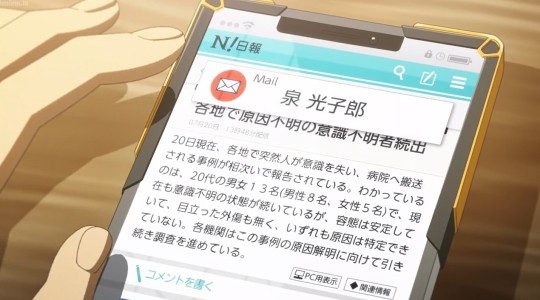
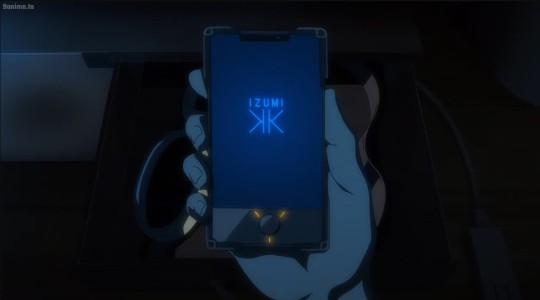
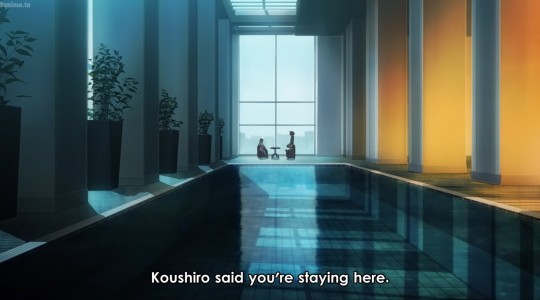

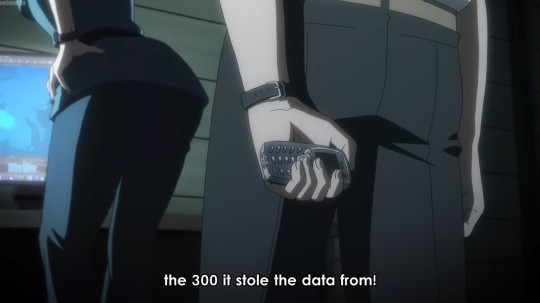
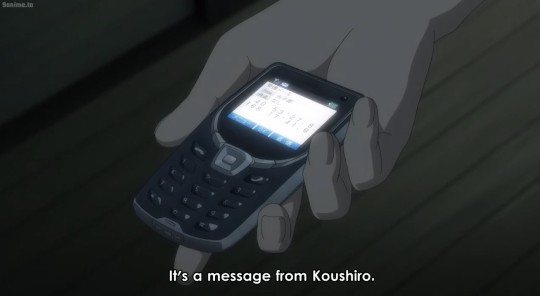
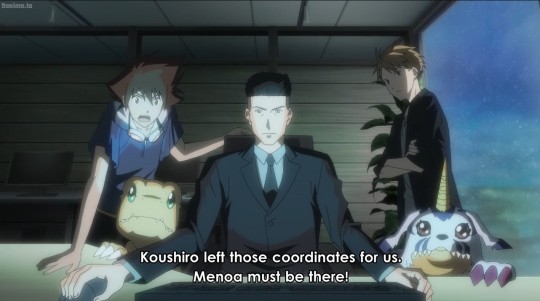
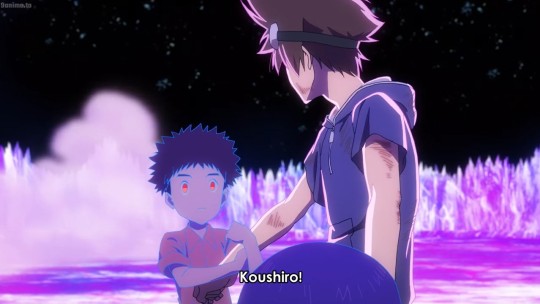
Digimon Adventure Last Evolution Kizuna Relationship Analysis: How the dramaturgy keeps telling the viewer that Taichi and Koushirou are always (and have always been) connected.
More than a year ago, I wrote my very first analysis post on Digimon Adventure Last Evolution Kizuna after having watched it for the first time - and my initial verdict regarding the relationship between Taichi and Koushirou was that there was some kind of implied drift between them. Granted, the narrative keeps hitting the viewer on the head about how it’s not easy to keep everyone together throughout adulthood and that Taichi’s situation (and mental health state) specifically is causing him to keep a distance to (the majority of) the others. Some of these points will still be part of the following analysis - however, after having watched the movie several times now and with a lot of bias pushed aside, I noticed that they’re actually more connected than the narrative makes you believe at first glance. Let’s take a look at this. (Disclaimer: There’s a lot of interpretation on my behalf of course, I’ve tried to gather as much evidence for my claims as possible, but in the end, it’s also still a fanon interpretation of their relationship.)
First of all, it’s noticable that the actual group still defending Tokyo from materializing Digimon has decreased significantly - at least at the time the movie takes place. Besides Takeru and Hikari, we only see Taichi and Yamato being involved in the first fight against Parrotmon, while Koushirou is managing the logistics from afar - not only is he the one able to open gates to the Digital World at will by now, but he is also the one who provides everyone with the technology they need for their fights to turn out successful. Smartphones, headphones, the (prototype) goggles Taichi uses... It’s easy to see how he’s basically their sponsor and Taichi the “guinea pig” to try it all out - and he does so voluntarily. Thanks to this translation here, we know that Taichi took the googles without permission. So while the others are obviously using Koushirou’s gadgets as well, Taichi seems to be particularly interested in trying them out.
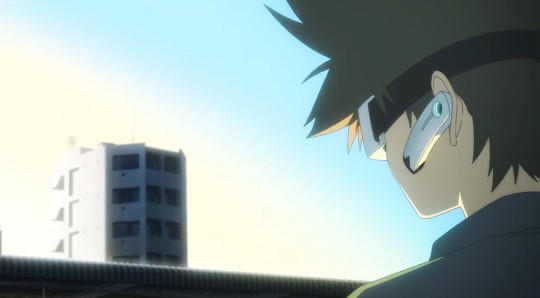

As mentioned, the phones the Chosen Children are using were also made by Koushirou’s company; he’s the connector who manages the Chosen Children network, he is being on-call and has all his contacts, chats and calls ready if required. It’s his logo that continuously appears throughout the movie. And why is it notable that it’s there? Because he and Taichi keep communicating with each other through electronic means; headphones, phones, text messages. And while Koushirou also contacts Yamato and Takeru to gather them all in his office, making it appear like a rather formal “work arrangement”, meeting up like that seems to be something Taichi definitely enjoys ditching his adult obligations for. Taichi immediately shuts down Koushirou apologizing to them for calling them despite knowing how busy they are; he dryly says that it’s an emergency, implying that it should have been natural for them to come after Koushirou asked - but seeing how giddy he appears to be upon going on an “adventure” with his closest buddies again, it does give the impression that he welcomes it all.



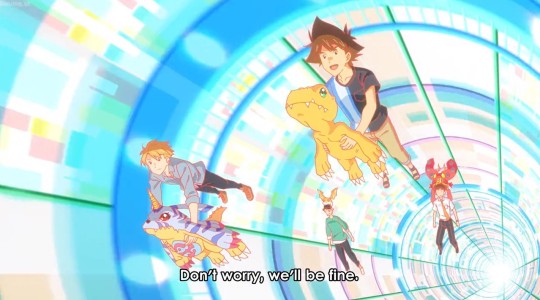
It seems to be something that boosts his confidence, so him reassuring Koushirou that everything will be fine is a nice change of pace - especially when you take into consideration that we’ve seen him being quite gloomy in previous scenes, unsure about his future, unhappy in his part-time-job, all alone in his tiny flat. Probably dealing with a lot of insecurities, self-doubt and maybe even inferiority issues - because even if it was never outright mentioned, a (potentially) subtle little nudge towards Our War Game tells the viewer once more that Taichi Yagami (understandably) doesn’t like it when smart people around him make him feel dumb - or when Koushirou actually interacts with people he deems much smarter than himself. (Perhaps - despite it being quite a stretch - he might even feel inferior towards Koushirou himself, who, being the CEO of his own company at the age of only 21, already has his life together for the most part, whereas Taichi hasn’t. And thus, we do not see Taichi confide in Koushirou throughout the span of the movie - which doesn’t mean that they don’t talk about personal issues at all, but Taichi seems to be more inclined to - superficially - mope about his future angst with Yamato, while still keeping the majority of his doubts to himself. Again, that’s mainly interpretation.)



Back to the communication part: One of the things that has been a constant throughout all of Digimon Adventure was that Taichi is relying on Koushirou figuring things out, giving him/them the information he/they need to progress. And even during adulthood, that still seems to be a thing. Sure, the narrative always required Koushirou to be “info-dump-boy” who easily figures out what is going on (because plot), but no matter how bleak things appear to be and even if they don’t seem as close with each other as they used to be on an emotional level, these two still trust in and rely on each other.
Taichi asks him about where Menoa resides, stays on the phone with him to make sure he’ll definitely know how to get to the place Hikari is being held hostage at - because he knows he can trust Koushirou 100%. In fact, despite the implied (emotional) distance, he actually seems to know quite a lot about what is going on with him - implying that, after all, he’s still attached to him. This is not only shown by him being the one who talks about Koushirou being the owner of a company to Yamato, but generally in the way he continuously mentions or refers to him.
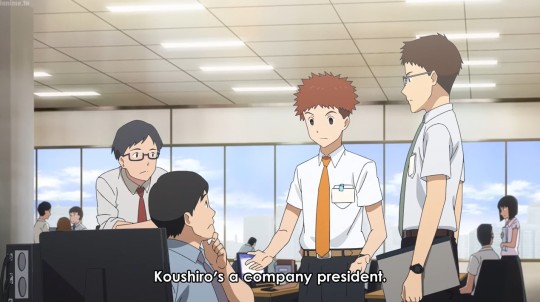
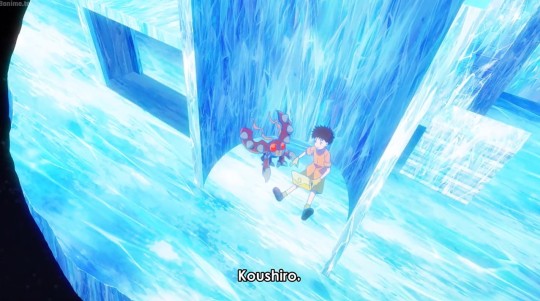
Looking at Koushirou’s perspective, he will go as far as to completely commit to the cause and sacrifice himself for the sake of making sure Taichi (and Yamato and everyone else) won’t lose their partners. His facial expressions throughout the movie tell you how bitter he is that he hasn’t figured anything out yet to stop the departure from happening.


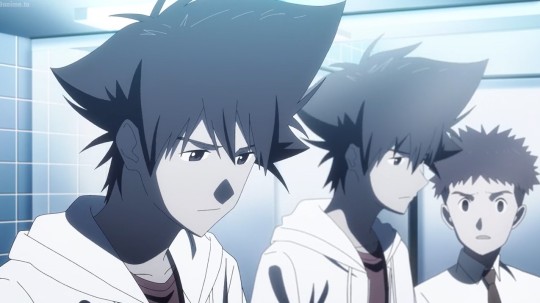

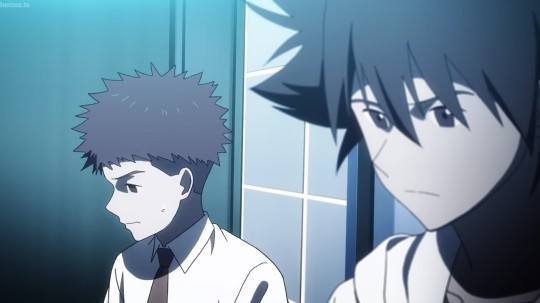
The novel-only part about “The Candle Of Life” eventually foreshadows that Koushirou is indeed willing to sacrifice himself (which is something he has always done): “Instead of taking things from people against their will, I’d rather give to them what I have before my end.” And that is exactly what he does - he manages to get the coordinates to the Digital Realm to Taichi before losing his consciousness, by typing on a pre-paid-phone behind his back like it’s the easiest thing in the world. Obviously, Taichi trusts in that information without a single shred of doubt - because it’s Koushirou it’s coming from.
And Koushirou himself? It’s not really a surprise that he - and Hikari - are the ones who latch onto Taichi while they’re being turned back into children. Because Taichi has always been among those people he’s been the closest with. My theory back then was that it may have been a subconscious action, fueled by the wish to stop Taichi from destroying this ideal world, in order to bring back old times, easier times, times in which they were much closer than they are now. But then again - is it really the case? Because the connection between them hasn’t really vanished. Koushirou - as shown above several times now - has always stayed in touch with Taichi; telling him about Digimon attacking the city, about trouble coming up, about his sister being in danger, always making sure he’d be okay and safe. (Which might also explain why he was so furious about Taichi taking the prototype goggles - since he has made goggles for him for several years now, it’s fair to assume that he wants his own creations to not be a safety hazard to his friend. Plus, Koushirou has always been worried about Taichi doing reckless things - even the stageplay picked up on this, repeatedly and with emphasis -, so this should not be surprising either.)
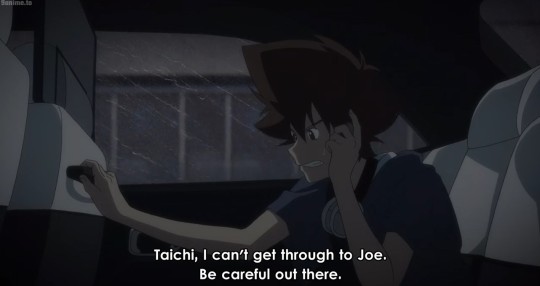
And in the end - as much as Taichi relies on Koushirou, Koushirou always relies on Taichi too. Hence why he sent the coordinates to him specifically. Because he’d always call/contact him first. He has done so since he was 10/11 and still does so as an adult.
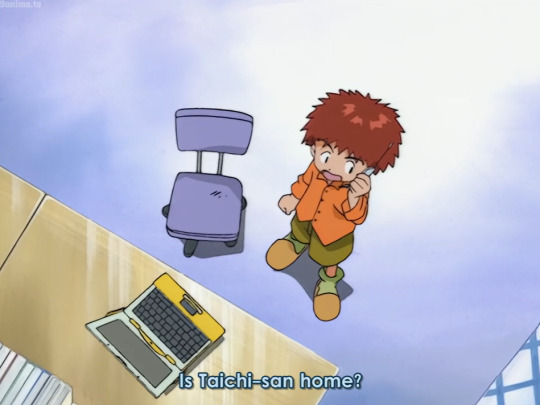

And since they’ve always been plan crafting like this together, it’s actually still fair to assume that this attitude has never really changed.
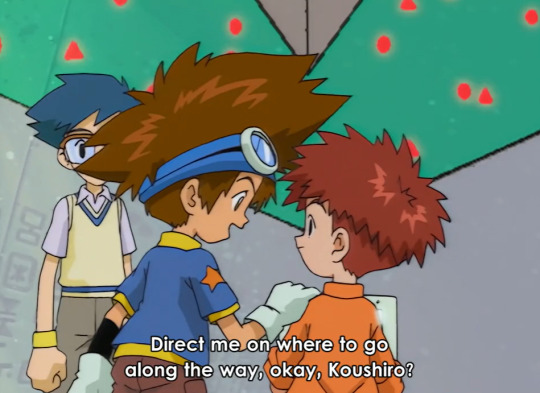
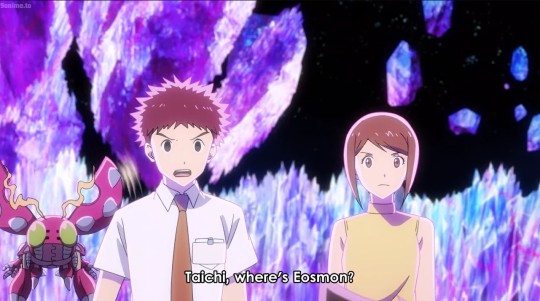

#taichi yagami#koushirou izumi#digimon adventure last evolution kizuna#digimon adventure kizuna#taishiro#taishirou#my two cents#meta#anime#digimon#koushiro izumi#izzy izumi#tai kamiya#look this is purely platonic because when i first watched this movie i was kinda sad#i mean the overall tone of the movie was sad but it reeeeally felt like my boys had drifted apart#but looking at things a year later it actually doesn't seem to be that grim anymore
57 notes
·
View notes
Note
I saw a post of yours that said you support planned parenthood and wanted to give you a heads up not to support them. The founder was racist
Hi there! I'd like to put a disclaimer on this post that while everything is backed by research, the base opinion is my personal opinion and it's absolutely okay if you disagree. So as always, take what resonates and leave what doesn't. Buckle in, because this is going to be a very long response.
This is a bit of a complicated and highly controversial topic. Planned Parenthood was founded in 1916 by Margaret Sanger. There's been a lot of discussion in recent years regarding the idea that Margaret was a racist ableist that supported the ideology of eugenics. Eugenics was an ideology that supported selective breeding in order to create a "perfect race." This further supported the idea at the time of fit groups of people with desirable breeding traits (upper class white people) vs unfit groups of people considered to be inferior (people(s) of color, different religious backgrounds, people(s) of the lower class, and people(s) with undesirable physical and mental characteristics.) Margaret Singer was a revolutionary of her time for women's health and advocated for women's contraceptives, rights to control her own body, and general sex ed and health. Birth control was condemned at the time because it was considered highly immoral and would lead to "the suicide of the white race." This ideology made it difficult for Sanger to promote her beliefs and when the "science" of eugenics gained popularity, she saw an opportunity to ally with them out of strategy to provide legitimacy to her own movement and to speak on her agreement with the eugenics movement of the "need to put an end to breeding by the unfit." Eugenists used this alliance to push contraceptives into black communities and Sanger went as far as to endorse the 1927 Buck v. Bell decision, in which the Supreme Court ruled that states could forcibly sterilize people deemed “unfit” without their consent and sometimes without their knowledge. It's still debated whether or not Sanger agreed with or opposed the eugenic ideology along racial lines, but it's widely accepted that, regardless of her personal beliefs, she did align with organizations that were explicitly based on white supremacy and paternalistic ideals of the time that worked directly towards undermining reproductive freedom and caused irreparable damage to the health and lives of generations of Black people, Latino people, Indigenous people, immigrants, people with disabilities, people with low incomes, and many others. Planned Parenthood has publicly denounced Sanger's belief in eugenics and has chosen to be transparent about her problematic behavior in or to better serve their communities now.
While Sanger was a revolutionary for women's health, she was also a product of her time and did not apply her progressive thinking towards racial issues. I do not condone or support Sanger's ideals regarding eugenics or her methods of gaining support and legitimacy, but I do support Planned Parenthood as a company. If we attempted to withdraw our support from every organization that had history condoning ideals we don't support today, our scope would be incredibly limited.
I am SO sorry for the long post, but information is important to come to your own educated conclusion. I am incredibly impressed if you've read all the way to the end.
14 notes
·
View notes
Text
You know, at this point in current DC books is there ANYTHING that Cass actually gains as a character in a story from being part of Batfamily?
Her friendships have been erased (Tim) or twisted to ensure she is always seen as lessen and inferior to other partner (Steph, Duke).
No one treats her as part of the family but something between an unpaid intern, creepy fangirl that is allowed to be here out of pity and Steph’s friend with personality of “responsible (read: boring) Asian” stereotype. She is certainly NOT treated as Bruce’s daughter.
Her entire origin and core motivation to be a hero have been mangled to erase her intolerance for killing because othertwise she could not coexist in one “team” with Jason, Kate, Damian and fucking Ghostmaker. Instead they made her entire origin and motivation revovle around Harper because they wanted Cass in Batfam and nothing beyond it. If you need to take away core aspect of a character to make them fit a team maybe that character should not be on a team?
Fuck, the whole REASON why she ever took on the bat symbol, which was because Batman was literally only person on the planet with as much hatred for killing as her, is gone. Batman who inspired Cass to become a hero was a man who was going to fire her on suspicion she may consider killing an option on the table, a man who would attack Huntress on sight because she kills people. Now? His no killing rule applies to him alone unless Harley Quinn writers wants to stirr up drama in her book. This is no longer Batman who would inspire Cass.
Relationship she had with Barbara is gone, Babs too treats Cass at best as unpaid intern she needs to boss around.
Cass is no longer a hero. She has no desire to save lives because that would overshadow Barbara. She is there because Babsgirl needs cheerleaders and that’s it.
Desire to be Batman? Gone. Not even recognized as a runner up by anyone, less alone Bruce.
Her skills are nerfed to the point she can no longer fight her way out of wet paper bag, losing to literally every character she fights with because writing her properly could derail the edgy “plots” and overshadow white people. Making her lose every fight makes, in mind of bad writers, the baddies look strong. In reality it makes her look weak and incompetent. And no, beating mooks doesn’t count, anyone in ficiton can beat hordes of ninjas, there is an entire tope about it. Alfred the cat could replace her in League of Shadows and nothing would change, ninjas would die like flies because that’s what ninjas in comics do.
Also, Tynion made Cass a killer, destroying core concept of her character even futher. So her compassion is gone too, as one does not work with the other, not for Cass.
Her disability is gone too because we needed to make her speak perfect english to make popculture references and read text messages.
Her being best martial artist? Informed ability with nothing to back it up at this point. Her being omitted from Lazarus Tournament (thus sending a message she was deemed not worthy to participate) while Damian was admitted also gives him more legitimacy than she has in current canon.
There is literally nothing she gains from being in the Batfamily. As bad as Teen titans books have been I think at least one of them would let her shine more than she was allowed to in any book since 2015 except Outsiders. Then again I wonder if damage done to her to push rest of the Batfamily isn’t so extensive it may be beyond fixing. At this point I fear killing her off may be more merciful than further debasement for sake of white people.
I mean, what DOES she gets from being in Batfamily at this point? Being infantilized for stupid groupchat jokes? being a backgroud prop to Steph and Barbara and maybe Ryan? Endless promises a Batgirls book that is clearly NOT happenning andan idea a book like this is coming may have been made up by fans altogether? Slowly turning into racist stereotype of a meek, submissive doormat that we have seen in Future State, an event that was supposed to show us what is DC’s “endgame” plan for all their characters and in which only Shazam and Wally West got more fucked over? Being in the background of group shots with white people or some shallow “family” moments? Gove me something.
-Admin
39 notes
·
View notes
Note
(pt 1) i really enjoy all your atla analyses & you've done a great job breaking down the usual arguments re how eip shows that kataang shouldn't have happened. i'm curious about your take on one specific argument that i just saw today, in an analysis of the show by a zker that was otherwise quite good and respectful (i know you've already talked about eip a lot, so no problem if you don't feel like rehashing). the premise: aang didn't just pressure katara in eip, he threatened her.
(pt 2) they point to when katara joins aang & asks if he’s alright: “aang: no, i’m not! i hate this play! katara: i know it’s upsetting, but it sounds like you’re overreacting. aang: overreacting? if i hadn’t blocked my chakra, i’d probably be in the avatar state right now!” the suggestion is he’s threatening her when he says ‘i’d probably be in the avatar state right now’ to describe his anger. i think this take exaggerates and oversimplifies it, but interested in your thoughts on it.
Hello my friend!! It is true I am Old inside and don’t like rehashing dhdlksjslks BUT your comments on my posts are always incredibly kind and insightful so I am more than willing to do a bit of rehashing for you 🥰 Besides! I’ve seen this general take before a few times and it’s always irked me for the exact reason you point out - it simultaneously exaggerates and oversimplifies the situation (and honestly that’s an impressive duality since it’s seemingly contradictory, so hats off to them lmaooo) - and now is as good a time as any to address it. So, for starters, let’s go ahead and get the excerpt they love to focus on so much:
Cut to Aang standing alone on a balcony. Katara enters and walks up to him.
Katara: Are you all right?
Aang: [Angered.] No, I’m not! I hate this play! [Yanks his hat off and throws it on the ground.]
Katara: I know it’s upsetting, but it sounds like you’re overreacting.
Aang: Overreacting? If I hadn’t blocked my chakra, I’d probably be in the Avatar State right now!
Here’s the thing about so-called analyses of this excerpt: in a manner extremely convenient to the poster, they never seek to contextualize this moment. (I mean, to do so would deplatform their entire “argument” - perhaps that’s why they avoid performing a full analysis?) So let’s avoid that pitfall from the start.
Firstly, below are some links to related posts; I’m going to do my best to summarize the most relevant parts, but for anyone who desires greater detail, I gotchu 😤
This post explains why EIP (the play, lol) is imperialist propaganda and is intended to belittle the entire Gaang.
This post explains how Aang never acted “entitled” to Katara’s affections, particularly in regard to EIP.
This post breaks down the infamous EIP kiss like Snopes Fact Checker, covering common misconceptions, important perspectives to consider, etc.
Alright. With that out the way, it’s time for some context.
Aang and Katara have this conversation on the balcony after watching 95% of “The Boy in the Iceberg,” a play chock-full of Fire Nation propaganda that demeans the entire Gaang in order to prop up the Fire Nation as superior (hence why the play ends with Ozai’s victory). Here is my general breakdown of Aang and Katara’s treatment in particular from a previous post:
- katara, an indigenous woman, is highly sexualized and portrayed as overly dramatic and tearful, because the fire nation objectifies women not of their own people and views them as less intelligent and less emotionally stable
- aang, the avatar, the sole survivor of the fire nation’s genocide of the air nomads who is incredibly in-touch with his spirituality and femininity, is portrayed as an overly-airy and immature woman. the fire nation portrays him with a female actor to demean him (like, that’s classic imperialistic propagandist tactics) and furthermore writing his character as a childish airhead reinforces the fire nation sentiment that the air nomads were weak, foolish people who did not deserve to exist in their world
In other words, these kids have just watched almost an entire play that preys upon their insecurities and depicts them using racist and sexist stereotypes about their respective nations. It is completely understandable that tensions might run a little high and that their interactions would not be as balanced as usual (Katara and Aang have a great track record of communicating well with each other, as it happens!).
So we have to keep that in mind when examining the aforementioned excerpt. But there are other factors to consider, too! Namely: they are kids. Children. Teens. Aang is 12, Katara is 14.
If we want to be scientific, a person’s brain doesn’t finish developing until they are 25, lmao, and the preteen/teen years are when the prefrontal cortex that controls “rationality,” “judgement,” “forethought,” etc. is still developing. This doesn’t mean Aang and Katara are irrational and make poor decisions 24/7 (obviously not), but it does mean that in an intense, highly emotional situation, like after watching a play that intentionally demeans them and depicts them as inferior, they are more likely to overreact, more likely to be emotional, and more likely to make mistakes. Like, I’m serious, lol. “Teens process information with the amygdala.” That’s part of the brain that helps control emotions! It’s why teens sometimes struggle to articulate what we’re thinking, especially in situations that require instinct/impulse and quick decisions, because we’re really feeling whenever we make those choices. Acting more on emotion. Our brains simply haven’t finished developing the decision-making parts, lmao.
In sum: Aang and Katara are both kids, not adults, and should be interpreted as such. This doesn’t negate their intelligence, because they are both incredibly smart and Aang is arguably the wisest of the Gaang, but they are human. Young humans. They have emotions, and we should not be so cruel as to assume they’d never act on them.
So taking that all together, we can now acknowledge the high stress Aang and Katara are under, understand why they might be upset (*cough* imperialist propaganda is hurtful *cough*), and examine how their youth might play into their emotional reactions. And funny thing - all analyses that come to the conclusion of Aang “threatening” Katara here do not usually bother with this context. I can’t imagine why!
And you know what, let’s add one more piece of context: Sokka states that Aang left the theater “like, ten minutes ago,” which is what cues Katara to go look for him on the balcony. The reason I mention this line is because to me, it suggests Aang knew he was more worked up than usual! He chose to separate himself from his friends so he could process his frustration! He did not take his anger at the play out on them; instead, he purposefully took time and space to be alone.
With that in mind, I don’t understand at all how Aang’s Avatar state quote could be interpreted as a threat? Canonly, Aang is someone who was aware enough of his frustration to separate himself from the others - yet the logical next step is him threatening Katara as a result? He knew his intense emotions were because of the play (which he says himself), so the logical conclusion is that he then pinned the fault on Katara? What?? Sorry, that interpretation has no textual basis, lmao. But I digress!
Aang tells Katara, “If I hadn’t blocked my chakra, I’d probably be in the Avatar State right now!” As you said, this is the line people point to in an attempt to justify their (baseless) conclusion that Aang is “threatening” Katara. So let’s bring in the two key pieces of context: imperialist propaganda and age. Given that Aang is 12, and given that Aang has just watched almost a full play that demeans him and everything his people stood for (and let’s not forget it also mocks his and Katara’s love for each other)…
His reaction is understandable. An exaggeration and needlessly dramatic, but understandable. He feels vulnerable and insecure and Aang is human. He is human and flawed and he overreacts here and I love that A:TLA shows how even our heroes, even people who are truly good at heart and in soul, can get overly upset (especially given the aforementioned circumstances!). Would Aang actually be in the Avatar state at that moment, had it been possible? Of course not! He’s young and he’s hurt and as such he says something dramatic to convey his anxieties and frustrations. The line is not meant to be taken literally, and seeing people do so despite all the factors that should be taken into consideration when analyzing it… Cue a long, tired sigh from me and so many other A:TLA fans.
And to be honest? I cannot fathom how people watch this episode and come to the conclusion that Aang is “threatening” Katara. To me, this episode - besides being a recap episode - is one that humanizes our cast even further. Aang snaps at Katara, kisses her when he shouldn’t (which the story appropriately treats as wrong). Katara pushes down her true feelings and retreats into herself, afraid to start a relationship with the boy she loves because she’s already lost him once before and can’t bear to do so again. Zuko further confronts the hurt he’s enacted upon others, especially upon Iroh. Toph practices being vulnerable and accepting vulnerability from others by conversing with Zuko. Sokka witnesses how others have erased his contributions and labelled him as nothing more than the token nonbender in the group. Even Suki learns that she is not the only person who holds a place in Sokka’s heart and that she can never replace what he has lost.
To watch this episode where our heroes must come to terms with how the Fire Nation deems them inherently inferior, with how they have more fights to overcome in the future with the Fire Nation than a single war, and to come to the conclusion that… that what, Aang is abusive? A monster? Irredeemable? That he would threaten his best friend, someone he loves in every way?
Wow. That says more than enough about the viewer, doesn’t it?
#getting back into the swing of things babey ✌️#aang#katara#kataang#kataangtag#the ember island players#atla#avatar the last airbender#amy answers#dramaticowl#amy analyzes#also i am speaking in GENERAL TERMS here lmaooo this is not a direct response to any one post 😂😂
113 notes
·
View notes
Text
𝕳𝖎𝖗𝖆𝖊𝖙𝖍
(𝙣). 𝙖 𝙝𝙤𝙢𝙚𝙨𝙞𝙘𝙠𝙣𝙚𝙨𝙨 𝙛𝙤𝙧 𝙖 𝙝𝙤𝙢𝙚 𝙩𝙤 𝙬𝙝𝙞𝙘𝙝 𝙮𝙤𝙪 𝙘𝙖𝙣𝙣𝙤𝙩 𝙧𝙚𝙩𝙪𝙧𝙣, 𝙖 𝙝𝙤𝙢𝙚 𝙬𝙝𝙞𝙘𝙝 𝙢𝙖𝙮𝙗𝙚 𝙣𝙚𝙫𝙚𝙧 𝙬𝙖𝙨; 𝙩𝙝𝙚 𝙣𝙤𝙨𝙩𝙖𝙡𝙜𝙞𝙖, 𝙩𝙝𝙚 𝙮𝙚𝙖𝙧𝙣𝙞𝙣𝙜, 𝙩𝙝𝙚 𝙜𝙧𝙞𝙚𝙛 𝙛𝙤𝙧 𝙩𝙝𝙚 𝙡𝙤𝙨𝙩 𝙤𝙛 𝙥𝙡𝙖𝙘𝙚𝙨 𝙤𝙛 𝙮𝙤𝙪𝙧 𝙥𝙖𝙨𝙩

𝐏𝐫𝐨𝐟𝐢𝐥𝐞𝐬

𝐃𝐨𝐧𝐠 𝐒𝐢𝐜𝐡𝐞𝐧𝐠 | 𝐖𝐢𝐧𝐰𝐢𝐧
he / him 28 Oct 1997
24 y o Bi / Taken
was @/detectivexsicheng
most of the time very blunt
pretty straightforward but can talk a lot when he wants to (read: nags and complains when annoyed and stressed)
he's a pretty simple man, not one for anything too extravagant and over the top
one thing he can't resist however is : food
oh and boba milk tea
has a good sense of justice, would do anything to protect people
is taken by @seventeen-chatbot's Mingyu
belongs to Seoul Police Agency's Golden Time Team
faced the loss of his mother at a young age
aeri is his sister figure, touch her and you die
he's awkward at times but get to know him and he'll be a soft little squishy
talks like this tags are sicheng.exe

𝐇𝐚𝐧 𝐀𝐞𝐫𝐢
she / her 9 June 1997
24 y o bi / crushing
face claim is @dull_ouuo on instagram
tsundere tsundere tsundere
she's called ice princess for a reason
but that's just because of the environment she was raised in
call her cute or flirt and you run the risk of either getting tazed or given a sick ass smackdown
she's weak for cute things and anything matcha flavoured though-- you didn't hear this from me
belongs to Seoul Police Agency's Violent Crimes Unit but occasionally works with the Golden Time Team
is currently single but crushing on someone
lost both her parents at age 6
she's pretty aloof and cold to strangers
but get past that tough shell of hers and you'll find a warm and sensitive person
that just wants love she rarely tastes
sicheng is her brother figure, touch him and you die
talks like this tags are aeri.exe

𝐘𝐨𝐨𝐧 𝐉𝐞𝐨𝐧𝐠𝐡𝐚𝐧
he / him 4 October 1995
26 y o bi / taken~
a little shit, a great detective and a handsome dude rolled into one
belongs to Incheon Police Agency's Violent Crimes Unit, working with the Seoul Golden Time Team to catch a serial killer
is oftentimes very laid-back but when work calls he shifts personas
expect to find him serious and merciless towards most criminals
to others however, we call him a corrupt cop-- pretty hypocritical I know
will strike deals and help bad people if he deems it helpful to himself and his loved ones
happily taken by his beloved dancer, his kitten @m00n-mia-cb
lost his mom at 19, his dad was sentenced to lifetime in jail
considers joshua and seungcheol his family
every superior at his station hates him cause he never follows their orders yet still manages to solve his cases
seems uncaring but mess with those he cares for and you're in for a painful journey
talks like this tags are jeonghan.exe

𝐊𝐢𝐦 𝐒𝐞𝐨𝐤𝐰𝐨𝐨 | 𝐑𝐨𝐰𝐨𝐨𝐧
he / him 7 August 1996
25 y o bi / interested
ex hacker and supreme lord of the keyboard
got picked up by sicheng and aeri when they assembled the Golden Time Team
belongs to Seoul Police Agency's Golden Time Team
he's still new to the police life but doing his best to be useful
cheery and positive, acting as happy virus
is very proud of his abilities, utilizes them to the max
may even pull you an illegal favor once in a while
his internet name is rowoon though he also goes by @lordglitchwoon
is currently single but interested in someone
talks like this tags are rowoon.exe

𝐂𝐡𝐨𝐢 𝐒𝐞𝐮𝐧𝐠𝐜𝐡𝐞𝐨𝐥 | 𝐒. 𝐂𝐨𝐮𝐩𝐬
he / him 8 August 1995
26 y o bi / sNATCHED
leader of the Golden Ravens, a mafia group mainly based in Incheon
confident and level-headed, has a steady rack of patience so he isn't easily pissed off
but if you make him angry you're gonna regret that pretty quickly
he's sadistic and ruthless once needed to be and won't hesitate to get rid of anything or anyone to get his way
best friends with jeonghan and joshua, considers them family
has been boxed up and shipped to two lucky people 👀
does get help from jeonghan and joshua a lot, indebted to jeonghan for saving him back when they were younger and joshua always provided a safe shelter for him and his members
workaholic™ it's gonna be tough to catch him unoccupied or swamped with work but he can make time for those he deems worthy of it
talks like this tags are cheol.exe

𝐇𝐨𝐧𝐠 𝐉𝐢𝐬𝐨𝐨 | 𝐉𝐨𝐬𝐡𝐮𝐚
he / him 31 December 1995
26 y o bi / simping crushing
was @/tattooartistjoshua
is a tattoo artist and stressed arts major college student
owns a tattoo parlor called De Lune at downtown Seoul, near the border that stretches into Incheon
don't be fooled by his multitudes of piercings, his tattoos, his leather jacket or his muscled arms
this bunny-faced man is nothing if not a softie
is currently single but is crushing very hard
gets dragged into jeonghan and seungcheol's shit most of the time, acting as middle ground for both
is the official tattoist for the Golden Ravens, being the only person to etch their insignia on as part of initiation process
he's a kind hearted and warm person, always being around to help no matter what the occasion
but despite his peaceful and docile nature he also has a mild inferiority complex due to his past
considers jeonghan and seungcheol his family, cross them and no matter how patient and calm joshua is he's shoving his tattoo gun's needle up your ass
talks like this tags are shua.exe

𝘼𝙘𝙩𝙞𝙫𝙖𝙩𝙞𝙤𝙣 𝙋𝙤𝙨𝙩 . . . under construction
𝙎𝙩𝙖𝙩𝙪𝙨 . . . under construction
✒️: @yanlee @iron-winwin @sydney-oc @adonis-jeonghan og rowoon (?) @/demon-seungcheol @/ceo-joshua
🏷️ : @1900s-cb @yvespunk @shin-haneul @purge-bots @militar-donghyun @black-x-swan-x-jisoo @yourchungha @vampiremomo @soft-magicxyujin @midari-jieun @ddlc-blackpink @yourhayoung @parkjiwoncb @spidermanxchan @thewolfpack-cb @princess-yeji @ateez-treasure9au-chatbot @urboys @androidbots @softie-yanan @soonyoungii @model-lucy @silverypurple-rosedlions @mafia-chae @badlands-ryujin @carnival-skteez @skz-bot @darkfaeskz @hernameisangel-oc @yan-svt @horrorlegends-cb @hbxchaewon @yourdaddychan @thewitcherhhj @daenerysolar @hybriddencb @spy-johnjsuh @witchy-ryu @doll-hyunjin @svtbrokenteam-cb @incubus-hwa @rentaboy-svt @influencerxcesia-oc [DM to be +/-]
68 notes
·
View notes
Text
Underappreciated Dragon Ball Character: The Crane Hermit's Story
The Crane Hermit is introduced as a very one-dimensional mustache twirling bad guy who quickly faded into obscurity, but after digging into his history and connecting the dots, I found him to be a rare 3 Dimensional villain from classic Dragon Ball.
I mean the dude starts out as a rich snob, humbles himself while befriending his one time enemy and forges a brotherhood with other martial artists under the same dojo. He even is so loyal and brave to the point of fighting alongside his brothers in arms to the bitter end against a horde of Demons. To top it all off, he was even willing to do it again when suggesting they come back and try to defeat King Piccolo again right after barely surviving their first encounter with him. This is very much in tune to what many noble members of the Dragon Team would do, meaning at one point, Crane was a redeemed villain like half the Dragon Ball cast, but willingly CHOSE to return to his old evil ways.
And this only happened after his master gave up the fight which turned his heart away from the light, as if GOODNESS itself betrayed him and/or the lure of the evil King Piccolo's power could've swayed him to be the self-serving man he is today. I would love to explore that side to him because there has to be something still awesome about him for Tien to have held such high respect for him
This is the story that I pieced together from watching a string Crane Hermit related episodes.
He is first introduced in Roshi's picture book as Roshi's good friend and owner of Inoshikacho with early designs before they shaved their heads and started wearing their master's uniform, like in the flashback of them fighting against King Piccolo. Those designs are used two more times, when Roshi climbed Korin's Tower and trained for 3 years gaining the power pole and Nimbus, so they must've looked like that for a few years at least. We get more details on their lives when Mr. Popo sends Goku to the past and meets a sort of cowardly or at least less confident Roshi, we know that this is more of a simulation of the past because this is basically used again for the humans to fight some weak Saiyans in early Z, so the events of Roshi and Crane starting out as romantic rivals in their teens and Crane's highly inflated attitude without any strength yet to combat Kid Goku implies that he came from a wealthy upbringing like a lot of similar people in old Kung Fu movies. You put these together and you got a very interesting character Here is how I rationalize it-
Roshi and Crane's bickering/ fighting over a girl likely got them disciplined hard by their mutually shared master, Mutaito. (Whom they both respected and studied under) Young Crane respected enough to restart his training over from scratch rather than being expelled during the Kid Goku goes to the past episode, so the probability that this would once again apply to a young Crane and possibly young Roshi in this new context seems pretty high. The punishments was probably super harsh and severe, probably was too much for Crane's flunkies to bare and they quit early, but NOT Roshi or Crane. They both are WAY, WAY too stubborn to quit early. Plus the thought of not wanting to be outdone by the other is what probably aided in pushing themselves past their limits throughout the harsh punishments and the intensive training.
So now it's basically two teenagers, one from a humble background and the other from a privileged background. Both with a lot of beef. Now stuck together alone. So while they're busy being bickering and competing, perhaps that girl they both were interested in, Fanfan, found herself a boyfriend in the meantime, leaving both of them heartbroken.
Now, since they are in the same boat together, they can start relating and bonding with one another as teenage punks do. Talking about mistreated they are, how unfair things, mostly complaining and roasting one another, etc. But the important thing is, they put their differences aside to overcome the challenges in front of them and this newfound bond leads them to becoming best friends.
The rivalry while healthier becomes stronger with time though because they're young and brash so Roshi goes to Korin's Tower at some point for bragging rights and Crane probably did something equally outrageous in an attempt to one up him, like maybe he won a Martial Arts Tournament or completed some grand trial of their dojo or something.
After being studying together for many years, they shave their heads and join the other students in wearing the formal uniforms of their master, so this is likely the peak of their disciplined lifestyle as Martial Artists.
Eventually this school made a stand and fought to the last man against Demons that terrorized and devastated entire cities and destroyed armies, harming countless innocents in the process. So in order to face such a threat implies a strong brotherhood and loyalty within the group.
Also the effect of his master giving up the fight being one of the factors for his turn toward evil implied that the Crane had great respect for him and that was the greatest disappointment of his life, plus the allure of power that King Piccolo showed must've been too tempting for him to resist so he left the losing side and returned to a lifestyle similar to his origin, using his skills in service of his own self and living it up in a lavish style (as shown in how much of a big spender he is and comparing his hotel room to the Turtle School's). In doing so, he purposely pushed away all the great teaching his Master had taught him, deeming them as weak or worthless for what he believed to being truly strong in his own distorted mind. He desperately needed someone like his Master to correct his misconceptions, and maybe at one time Roshi tried to, but failed because Crane closed off his heart to his once best friend (kind of like Gintoki and Takasugi frrom Gintama) who exemplifies everything he now hates and stands against.
Though some lessons still stuck, like loyalty, specifically to his brother Tao. Which is his prime motivation in the 22nd tournament was to avenge his brother and he even lamented on how they never patched things up so he tried getting justice for him instead of blaming himself. Dodging accountability, but accepting responsibility. Proving maybe even he is not too far gone, if he felt their was even a point to change.
But that doesn't mean he was the nicest brother. His pride and jealousy couldn't stand the idea that his brother was far more naturally gifted than him and so he attempted to sever one of the few remaining bonds he has in his long life of losses, with his own hand because of his own inferiority complex.
He allowed his greed, anger, pride, and jealousy blind him to what would've been his greatest legacy as a Master of Martial Arts. His students. The most well known are Tien and Chiaotzu. Who he long since failed to guide them to the righteous path which led them pass the point of no return. Tien and Chiaotzu were one in a million prodigies that he wanted to turn into a mere weapons at his command. To make matters worse, these self-centered, cruel and down right malicious teaching actively corrupted Tien's nature and forever shut his Third eye's truest abilities. So he didn't nurture his disciple like he was completely capable of, instead, he actively/incompetently crippled his number 1 student forever preventing him from reaching his full potential by stealing his birthright. Truly failing as a Master.
He makes one last appearance in the 23rd Tournament feeling betrayed and wronged, but leaves as a coward. It is such a shame to see what once was a great man, how far he had fallen.
His Death. Toriyama mentioned that he and his brother Tao Pai Pai got in over their heads and died somewhere in the middle of Z off-screen. In-spite of all of his gifts, he utterly failed as a Master by actively trying to spite everything his Master taught him and what did all of his efforts and years of experiences gift him with? An inconsequential death that will not be remembered, which is heartbreaking for a man who was once and could've forever remained as great as the fan-favorite Master Roshi. It is a shame because unlike his teacher, he never redeemed himself, not even in death. What could've been a Legend, instead turned into a Cautionary Tale.
Honestly, it is such a shame that this character wasn't utilized more. I've got a few more Crane Hermit related headcannons, some from when he was younger, some of how he could've been used after the 22nd Martial Arts Tournament, like a role in the King Piccolo Saga since that is so closely tied to his past, watching his continual, but strained relationship with his students, etc.
#@bushidraw#dragon ball#crane hermit#dragon ball classic#tao pai pai#general tao#tien#tenshinhan#master roshi#muten roshi#headcannon#dbz#cautionary tale#shen#shin#crane shcool#failed master#master mutaito
24 notes
·
View notes
Text
Given Movie: Anime Eiga Interview
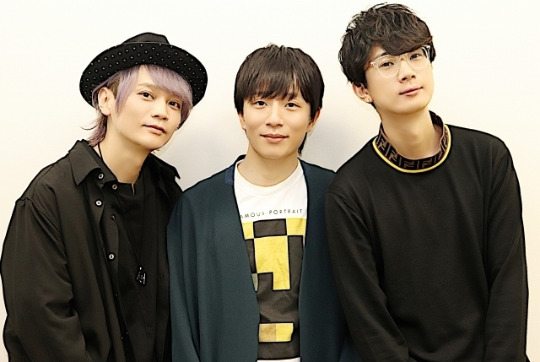
The adult trio of “Given”, Nakazawa Masatomo, Eguchi Takuya and Asanuma Shintarou – finding out about each other’s appeal through proffering a deep love.
The sequel to the TV series that adapted Ms. Kizu Natsuki’s popular BL manga into an anime came in the form of “Given the Movie” and made its appearance in the big screen. Along with sensible expressions of emotion, this series depicts the circumstances of youthful love connected by music, capturing the hearts of the viewers. The movie portrays the “bitter and passionate love” between the band’s “adult members”, Haruki and Akihiko, as well as Akihiko and his ex-boyfriend, the genius violinist Murata Ugetsu, whom he continues to live with even after breaking up. Hence, this time, we have hit up Nakazawa Masatomo, the voice of Haruki, Eguchi Takuya, the voice of Kaji Akihiko, and Asanuma Shintarou, the voice of Ugetsu. What kind of appeal did they sense from one another after co-acting in roles where they had to proffer intense love? We had each of them discuss their thoughts.
Discovering the charm of the characters anew in a movie where the feelings of each accelerate.
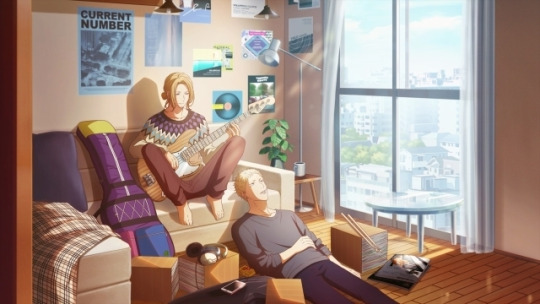
——The movie is about the romance between Haruki, Akihiko and Ugetsu. The thoughts that they had been concealing are exposed, so what were your impressions when you read the script?
Nakazawa: In the TV series, Haruki, the character I play, was thinking about “wanting the band to do well” and “what he should do for the band’s sake”, being a “sideline support” for Mafuyu and Ritsuka, together with Akihiko. Haruki and Akihiko are said to be part of the “adult group”, but the two of them have their own ways of thinking - Akihiko is the type that aims for good things by taking action using a detonator. On the other hand, Haruki is always calmly concerning himself with everyone, so that they can do things freely. Both of them listened to Mafuyu’s singing voice, were influenced by it and suffered changes, so I felt from the script that I could get a glimpse at these changes. Regarding Haruki, he started feeling his own loneliness more strongly, and while watching Mafuyu display his musical talent more and more, he also had a complex about being just an ordinary person who liked music a little bit. I felt like we were able to see what Haruki was carrying under the surface.
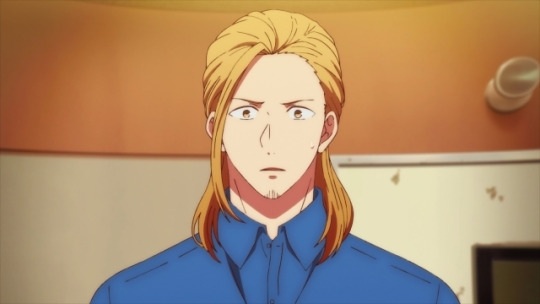
——Were there any points where you felt the appeal of Haruki and Akihiko all over again?
Nakazawa: There were. Haruki never tells Akihiko that he likes him and does his best to hide it. It’s totally obvious, though... (laughs). Through Haruki, I felt that there are things you convey not with words but with feelings, and on the other hand, there are things that can finally be conveyed when you put them into words.
——Eguchi-san plays the role of Akihiko. Please tell us your impressions of the script.
Eguchi: I had read the original work, so I was looking forward to seeing the hearts of everyone from the “adult group” being moved and them putting an end to things. When I read the script, this is quite obvious, but I had many lines (laughs). Akihiko shows in it a part of himself that he never had until then, so destroying something like a sculpture of Akihiko that the TV series had warmed up was necessary work. Moreover, it was the kind of scrip that allowed for all kinds of fun, such as how long the monologues and narrations should be, so I felt a strong sense of compensation from it. During the recordings, I first tried throwing in what I had come up with. The team makes you want to create something together with them, so I felt like making up my mind and challenging myself. I was very happy to be able to take on the challenge.
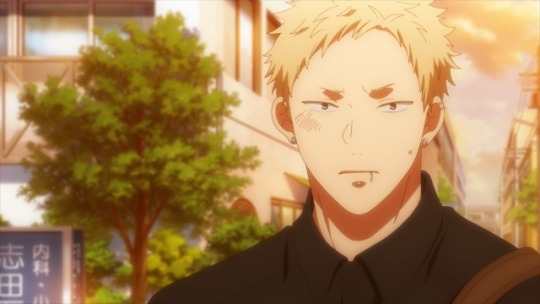
——When you threw it in, were you able to see a new side to Akihiko’s appeal?
Eguchi: “So he was THAT compassionate?!” was what I thought. Akihiko is always cool, so I wondered when his emotions would take a swing, but I think this was a sign that he was afraid of “changing the present”. In the movie, I had to carry out the job of Akihiko properly facing all sorts of things and doing a retake on his true feelings. He gave off more of an adult impression until that point, so I think I got to see a more realistic, young part of him.
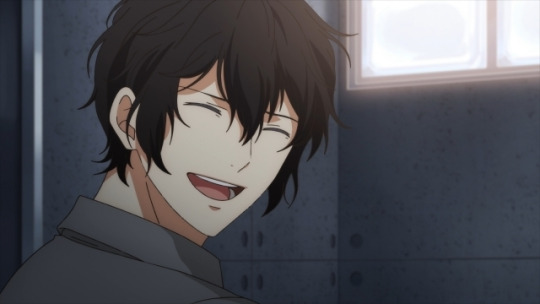
——Asanuma-san plays the role of Ugetsu, who continues living with Akihiko after breaking up.
Asanuma: There were few episodes in the TV series where Ugetsu showed up, but even in them, there are crucial scenes in which you can get a glimpse that “Ugetsu is this kind of person”. It’s exactly because he is a genius that he acts indifferent about anything other than music, gets fawned on in a genius-like way that makes people think, “If he says so, then there’s no helping it”, and has great interest in people like Mafuyu, whom he feels sympathy for. There’s a scene in the movie where Ugetsu and Mafuyu meet for the first time, and when I read the script, I felt that “Ugetsu approached Mafuyu with honest feelings”. It’s because he has sympathy for Mafuyu that he ends up telling him things that he can’t say to Akihiko face-to-face, such as “I love Akihiko to death”, and shows a side of himself that he usually doesn’t show to other people. It seems he speaks out his feelings when he’s with Mafuyu for some reason, which made me wonder if it isn’t Mafuyu who has the power to make people act like that.
——Ugetsu has a mysterious charm as a character. Was there anything you deemed as important when performing him?
Asanuma: It was my first time taking part in a BL show, but I felt that “Given” is a series that portrays emotions very delicately, down to the details. When performing, it’s exactly because the depictions of emotions are detailed that I make sure not to be “too theatrical”.
Love becomes more complicated as you grow older?
——In the TV series, we were able to see Mafuyu and Ritsuka’s high schooler-like romance, yet the movie is about an “adult love”, where they are “going through unfulfilling and agonizing situations, but no matter what, they like each other”. Was there anything you felt seeing their love?
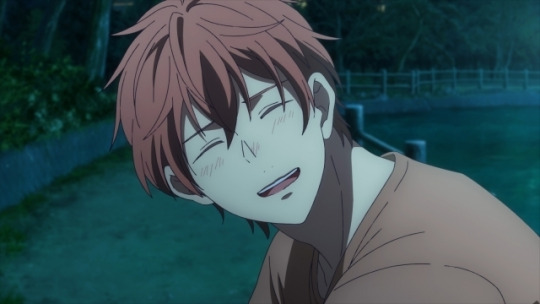
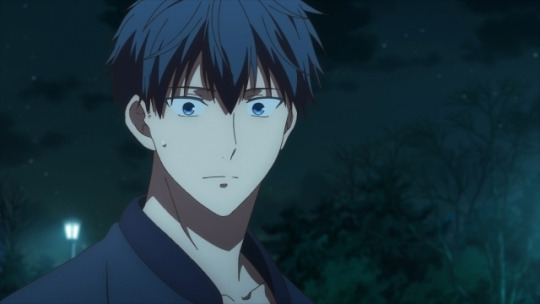
Asanuma: There are things that we end up complicating precisely because we have accumulated experiences as adults. It’s because we know about all sorts of things that we don’t want to get in the other’s way and feelings of inferiority towards the other are born. When you’re a child, you don’t think much about things such as “pulling away because you think too much about the other person”, for example. There are many things we have to face when we become adults, so we might turn the feeling of “romantic love” around in complicated ways.
Nakazawa: I think “being able to break up once and for all” is important in adult romance as well. Not clashing with each other like, “I can’t do this with you anymore!” and parting ways, but instead ending it with, “If that’s how it is, it might be better for us not to be together anymore” after learning about each other’s circumstances is also a form of love. I think that reflecting about not just the feeling of “love”, but also about what you should do to make the “we can’t be together anymore” that lies ahead into a reality is what adult romance is.
Asanuma: They’re called the “adult group”, but they’re not adults yet. Even I, who am in my 40’s, have yet to come across anything like an “unconditional love”...
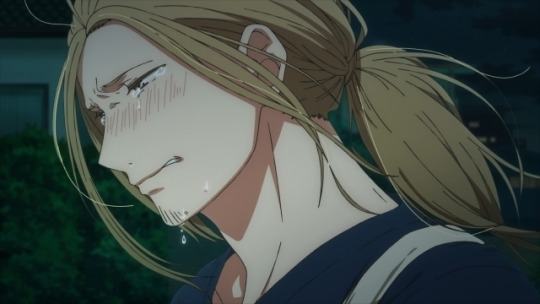
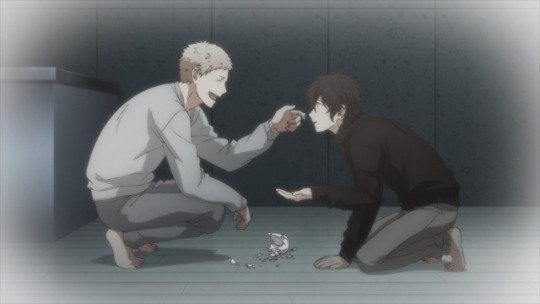
Eguchi: I believe this is valid for all kinds of romantic love, but I think it’s about being together with someone because you find that person to be an “irreplaceable existence”. And it’s because they’re irreplaceable that going out with them isn’t the goal, and the couple has to properly face one another. Also, when I looked at their romance, I felt it’s precisely because they like and are close to each other that there are words between them that they can’t say. They might have had a different relationship if they had conveyed those words, but there are words that can’t be conveyed exactly because this possibility exists. I think humans are extremely complex.
“Eguchi-kun is sharp!” – A casting that fit perfectly.
——What kind of appeal did you feel in each other’s acting and personalities through “Given”?

Nakazawa: The way that Asanuma-san bears a “quiet intensity” when playing as Ugetsu is very charming.
Asanuma: For real!?
Eguchi: And you’re also too good at putting on the air of a genius!
Asanuma: It’s only putting on, though. I have to make sure not to take it off too soon (laughs).
Eguchi: It had me thinking, “The way he envelops himself in the air of a genius is just genius!” Asanuma-san can push and pull splendidly. I was thinking, “He’s so awesome” when I watched it.
Asanuma: There are times when I tend to explain things with my voice no matter what. Before, in a different work, the sound director told me, “The animation is already doing the explanation, so you don’t have to try to explain with your voice so much.” In works like this one, where the subtleties of the characters’ hearts are so detailed, I think it’s even more important to bear in mind “not being too theatrical”, without deeming it as an exception just because it’s a BL, but instead seeing it as a love pattern that could happen anywhere and performing naturally.
——What is your impression of Nakazawa-san?
Asanuma: Nakazawa-san is tolerance incarnate! He can be no one but Haruki.
Eguchi: That’s right. He gives off a “mom” vibe (laughs). He’s like that during the recordings too; Nakazawa-san himself is a very soft person.
Asanuma: And although he may disagree, “looking troubled” suits him.
Nakazawa: I disagree!
All three: (Burst into laughter).
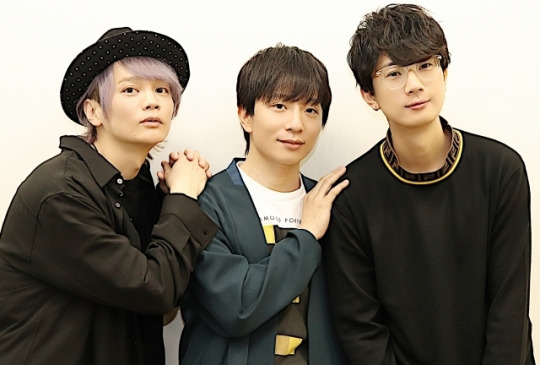
Asanuma: Since being troubled suits you, it feels like people gather around you, thinking that they “want to try and give you trouble” without any ill intent.
Nakazawa: That rings a bell (laughs). Indeed, I myself think that I have a Haruki-like side too. I also have a side that accepts basically anyone and any kind of comment... As for Eguchi-kun, if nothing else, he’s sharp! In terms of voice quality, his tone is low-pitched and solid, so the acting that he brings out is extremely sharp. There’s a fineness to it where it acts as a detonator, especially in “Given”, as if it will set fire, to his heart’s contentment, to anything that seems inflammable. He pulls off an acting that has an explosiveness to it, as he takes ahold of the important points while performing in a natural manner, so I have a lot of trust in him.
Asanuma: Eguchi-kun gives off a sense of broad-mindedness and security. Not because his body is big, though (laughs). I feel that he’s something like an emotional bodyguard. It was my first time in a BL series, but when I heard that Eguchi-kun would be the other party, I vaguely thought that “everything will go well”.
Eguchi: Thank you so much!
#given#dailygiven#givendaily#dailyshounenai#fyeahgiven#given movie#nakayama haruki#kaji akihiko#murata ugetsu#eguchi takuya#seiyuu#asanuma shintarou#nakazawa masatomo#my translation#interview#anime eiga
49 notes
·
View notes